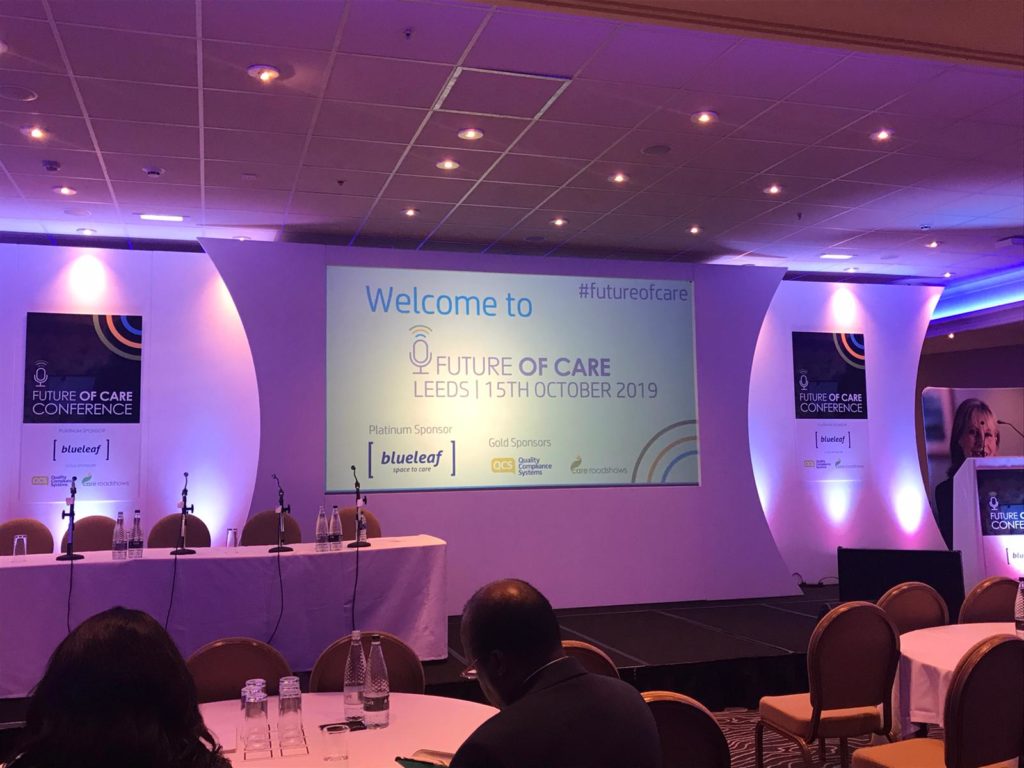Discussing the Future of Care – what’s next for an evolving sector?
Written by Rebecca PaddickTaking place in Leeds, Future of Care 2019 asked; where is the social care sector going? What solutions are there for those shaping the industry? How will technology and innovation impact the sector?
Chaired by ITV newsreader Sameena Ali-Khan, the day boasted an impressive line-up of speakers. Ros Roughton, Director for Adult Social Care at the Department of Health and Social Care, stood in for Caroline Dinenage MP, Minister of State for Care, who was due to discuss government priorities for the future of adult care. Roughton reiterated ongoing funding issues, saying that there is “a lot of unfairness in the current funding structure,” but there is “no single solution.”
Making the sector stable
Roughton stressed that the current government is committed to making the sector stable, and also said that housing, technology and workforce are the three wider issues the government are looking to address. When it comes to tech, Roughton said that all eyes are currently on predictive analytics; with the sector being urged to use the data they already have to help support people with differing needs.
She also stressed the importance of adding value to working in the care sector, in order to help address workforce challenges – a thought echoed throughout the day, and one which was very prominent in a session hosted by Sheila Grant, Head of Inspection at the Care Quality Commission. Sheila discussed the Quality Adult Social Care Services, and how we can meet the needs of a changing population. She said that just 1% of care homes across the country are now rated inadequate, but this, she quite rightly said, is still far too high. She also stressed that it is absolutely crucial that we source and nurture good leaders in the sector, as this will breed a culture of high standards.
However, the night before the event we heard the Queen’s Speech, outlining plans for the parliamentary year ahead. Some have reported there was a distinct ‘lack of compassion’ for the social care sector. Sentiments echoed by Kathryn Smith, Chief Operating Officer at the Alzheimer’s Society, who talked about how we can create a fair and sustainable system of support for people living with dementia.
The CQC’s State of Care report was also released just before this year’s Future of Care event. It highlighted that the stability of the adult social care market remains a particular concern, and that an estimated 1.4 million older people (nearly one in seven) do not have access to all the care and support they need. It also stated that in many cases, crises could have been averted if local health, care and education services had worked in unison to provide an integrated package to support those in need. Although progressing unevenly in different parts of the country, the CQC have said it has begun to see evidence of more integration and/or joint working emerging.
Anita Charlesworth CBE, Director of Research and Economics, at The Health Foundation, stressed the importance of an individual-centred approach versus a system-centred approach. And Sally Gretton, Head of Area, Skills for Care, explained how employers can recruit, retain and develop people to ensure high quality, effective care services.
Changing the narrative on staff and recruitment
This led nicely into a talk by Charles Armitage, CEO & Co-founder, Florence, who discussed the changing the narrative on staff and recruitment in the health and social care sectors.
Later in the day, a panel debate on workforce shortages in care homes discussed how innovation will impact recruitment and retention in the sector. When discussing the long-awaited social care green paper, Cllr Jim Clark, Chairman at North Yorkshire County Council summed up care professional’s feelings, in a nutshell: “Social care is seen as the poor relation to healthcare, and that’s because we are often working against each other. Integrated care is the way forward. It’s not paper we need, it’s action.”
Interestingly, when the panel were asked about the implications for EU employees working in social care post-Brexit negotiations feel they are as prepared as they can possibly be. Tracey Holroyd, Chairman of Warmest Welcome summed it up when she said: “We’ve done all we can, we all just want it to be over with!”
Events such as these allow people to discuss key issues, share best practice, offer advice and present solutions to the ongoing problems across the sector. Will we see a Brexit deal within the next few days/weeks/months? Will the green paper ever materialise? Who knows. But Future of Care has shown that there is a real sense of community in the face of ever-challenging times.



